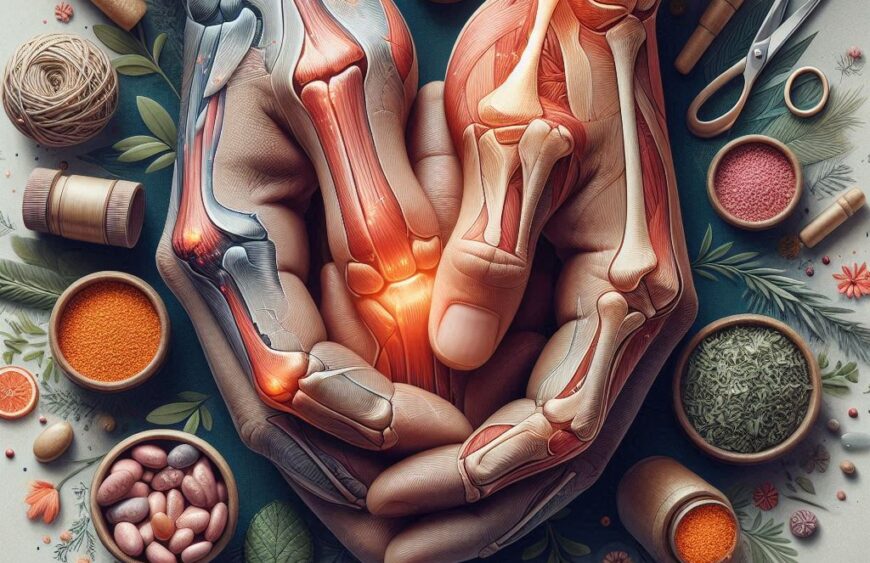Chronic joint pain and arthritis are often driven by inflammation. For centuries, people have turned to herbs and natural remedies to soothe aching joints. Today’s research confirms that certain plant compounds can significantly reduce inflammation and pain.
Key anti-inflammatory herbs include turmeric (curcumin), ginger, and boswellia (Indian frankincense). These herbs contain bioactive molecules that modulate the body’s inflammatory pathways. For example, curcumin from turmeric blocks enzymes like COX-2 and inflammatory cytokines, much like conventional pain relievers. Likewise, ginger contains gingerols that dampen inflammation via similar mechanisms.
Boswellic acids in boswellia gum resin also inhibit 5-lipoxygenase, reducing inflammatory leukotrienes that damage joints.
Modern clinical trials support their use. The Arthritis Foundation notes that curcumin supplementation (around 1,500 mg/day) has relieved osteoarthritis pain as effectively as some NSAID drugs. Similarly, a Cochrane review found that a three-month course of boswellia extract “reduced osteoarthritis pain by nearly 20 points and improved function by eight points” on a 100-point scale.
In other words, patients taking boswellia saw meaningful pain relief and better mobility. Ginger has shown benefit too – research indicates daily ginger extract can “modestly reduce pain and disability in hip and knee osteoarthritis”arthritis.org. In some cases, these herbs have safety advantages over long-term use of high-dose pain medications.
Herbs and Their Effects
-
Turmeric (Curcumin): Potent anti-inflammatory. Blocks inflammatory enzymes (COX-2, LOX) and cytokines, reducing pain signals. Studies show curcumin can alleviate arthritis symptoms comparably to drugs like diclofenac. It also has antioxidant properties that protect joint tissues.
-
Ginger (Zingiber officinale): Contains gingerols with NSAID-like effects. Ginger has been shown to inhibit genes involved in inflammation. Trials report significant reductions in joint pain and swelling, and improvement in grip strength with ginger supplements. It also promotes blood circulation to affected areas.
-
Boswellia Serrata: Known as frankincense, its boswellic acids are strong anti-inflammatories. They prevent the formation of leukotrienes that drive arthritis. Clinical data (including a 2018 systematic review) highlight boswellia as a top supplement for short-term joint pain relief. It also appears to slow cartilage damage.
-
Devil’s Claw (Harpagophytum procumbens): (Traditional African herb) Contains harpagosides, which inhibit inflammatory prostaglandins. Often used for rheumatoid arthritis and lower back pain. Some studies suggest measurable pain reduction over placebo. (Note: Use cautiously if you have ulcers.)
-
Willow Bark (Salix alba): The original source of aspirin (salicin). It provides mild pain relief similar to NSAIDs, with fewer digestive side effects. Can be brewed as a tea or taken as a supplement.
-
Chamomile & Peppermint: While not as directly anti-arthritic as the above, these herbs can relax muscles and reduce stress, which helps ease tension around painful joints. A Relaxation Tea blend (with chamomile and lemon balm) is often recommended to promote restful sleep and reduce inflammation indirectly by lowering stress hormones.
Traditional Use Meets Modern Evidence
Many of these herbs have been staples in Ayurveda, Traditional Chinese Medicine, and African herbal medicine for joint pain relief. For example, Ayurvedic formulas for arthritis have long included turmeric and boswellia. Today, Western medicine is increasingly acknowledging this wisdom. According to arthritis experts, taking turmeric or its extracts “may help prevent bone breakdown” in rheumatoid arthritis and reduce osteoarthritis inflammation. In practice, herbalists often combine several anti-inflammatory herbs for a synergistic effect.
Herbal teas, tinctures, and capsules are popular ways to consume these remedies. For instance, Herbs & Spices by Bukky’s Arthritis Herbal Tea is a ready-made blend that includes turmeric, ginger, and boswellia as main ingredients. Drinking 1–3 cups daily provides a warm, non-pharmaceutical means of managing discomfort. Similarly, the Pain Relief Capsule product (also on Bukky’s site) is described as a fast-acting natural formula for joint and muscle pain, targeting inflammation without chemical side effects. Its plant-based ingredients are designed to “calm the nervous system” and reduce swelling.
It’s important to note that herbal remedies can take longer to show results than drugs. Consistency is key. Many people find their pain steadily diminishes over several weeks of use. Always use herbs as part of a holistic approach: combine them with gentle exercise (like swimming or yoga), a healthy anti-inflammatory diet (rich in omega-3 fats, leafy greens), and maintaining a comfortable joint range of motion.
Recommended Anti-Inflammatory Products
From the Herbs & Spices by Bukky catalog, consider:
-
Arthritis Herbal Tea Care Combo: This trio includes the arthritis tea plus supportive supplements. The tea itself is “packed with natural ingredients like turmeric, ginger, and boswellia” to fight inflammation. It’s easy to prepare (steep 5–7 minutes) and can be sipped daily.
-
Pain Relief Capsule: A convenient supplement for active relief. It’s formulated to “help relieve body pain, joint discomfort, and inflammation without the side effects of synthetic painkillers”. Use this alongside the tea for days when pain flares.
-
Heat Therapy and Oils: In addition to ingested herbs, applying warmth (like a heating pad) to stiff joints and using topical herbal oils (such as those containing eucalyptus or arnica) can enhance comfort.
Takeaways
-
Herbs Target Inflammation: Turmeric, ginger, and boswellia are among the most studied herbs for arthritis. They work by blocking inflammatory pathways (e.g., COX-2, leukotrienes).
-
Clinical Evidence: Rigorous trials show meaningful benefits. For example, curcumin and boswellia each reduced arthritis pain scores in studies.
-
Gentle, Holistic Relief: Herbal blends (like Bukky’s arthritis tea) provide a gradual, sustained effect without the digestive or liver strain of high-dose NSAIDs.
-
Use Consistently: Drink herbal joint-support teas daily and take capsules as directed. It may take weeks to notice full benefits, so patience is key.
-
Complementary Strategies: Maintain a healthy weight, stay active with low-impact exercise, and consider physical therapy. Herbs are most effective when part of an overall wellness plan.
By incorporating these anti-inflammatory herbs through supplements and teas, many people achieve significant joint pain relief. The combination of time-tested remedies with modern evidence makes this approach a powerful tool in managing arthritis and supporting lasting mobility.
Discover more from Herbs And Spices By Bukky
Subscribe to get the latest posts sent to your email.






